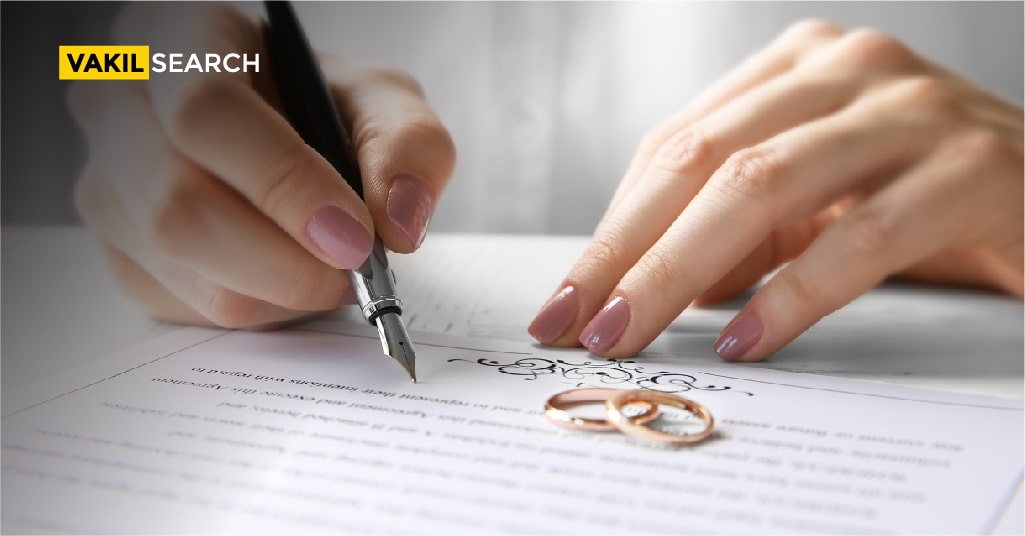In this article, we will learn about the remedies for objections raised by registrars for marriage registration.
A Marriage registration certificate is a report that pronounces two individuals wedded legitimately. Relationships in India are to be enlisted under the Hindu Marriage act, of 1955 or the Special Marriage Act, of 1954. In the year 2006, the Honorable Supreme Court made it compulsory in India to get a marriage enlisted to sanction it.
However the majority of individuals realise that it is mandatory to get the marriage enrolled in India, they come up short on information on the system and end up either paying a lot to a specialist or getting an excess of disturbed. Here’s how you can get a marriage enrolled in India.
Online Registration of Marriage
Online enlistment for a marriage endorsement is very much like the other fundamental things accessible online in India nowadays, enrollment in marriage online is additionally a choice. Online enrollment is a more favoured choice since it saves time and inconveniences less, one doesn’t need to remain in lengthy lines, particularly in this period of social separation. It skirts one’s various gatherings with the marriage enlistment centre.
Here are the steps:
- Navigate to the official website of the applicant’s home state.
- Add the personal information of both the parties involved in the form.
- Once completed, submit the online marriage certificate registration form.
When the form is completed, the marriage registrar will summon the applicant for a specific date and time. It is mandatory to appear on time at the marriage registrar’s office with all of the documents required. In addition, at the marriage registrar’s office, two witnesses from each side must be present.
It is worth noting that the marriage date and time given by the marriage registrar for a marriage under the Hindu Marriage Act,1955 is nearly 15-30 days after the form is submitted. Furthermore, it is approximately 60 days in the case of the Special Marriage Act, of 1954.
Offline mode of Registration of Marriage
- Under the Hindu Marriage Act, 1955
As talked about, relationships in India can be enrolled under either the Hindu Marriage Act, of 1955 or the Special Marriage Act, of 1954. Regardless of their religion, it is material to all residents of India. The gatherings applying for the enlistment of marriage in India are just qualified, provided that they are either Hindus, Sikhs, Jains or Buddhists. Likewise, if the marriage is as of now solemnised, the couple can apply for enrollment.
One needs to visit the workplace of the sub-recorder under whose locale, the marriage was solemnised. It tends to be done at the sub-enlistment centre’s office, under whose purview; one of the accomplices is living for over a half year. As indicated by the traditions and customs of both of the party, a Hindu marriage can be solemnised.
- Under the Special Marriage Act, 1954
Regardless of their religion, every one of the residents of India can get their marriage enrolled under the Special Marriage Act, 1954. Under this enlistment, alongside solemnisation, is given to the couple by the marriage official. As examined, the couple applying under the Special Marriage Act needs to allow a 30 days notification to the sub-enlistment centre under whose locale, any of the accomplices lives.
The recorder sets up a notification on the board for 30 days, and in the event that he/she doesn’t get and complaint inside the length, the marriage gets enrolled. The sub-recorder of the purview should keep a version of the notification. This entire cycle leads the marriage to be completed without any function. Special Marriage Act, 1954 is an option for the people who are not qualified to enrol their marriage under the Hindu marriage act in India.
Objections Raised for Marriage Registration
When the marriage officer receives the application, he will issue a thirty-day public notice to raise objections related to non-compliance with the conditions set out in Section 4 of the act. If the conditions are met and no objections are raised, both parties will be asked to sign the marriage certificate, and the marriage will be said to be solemnised and registered.
The marriage officer is required to conduct an investigation into its validity within 30 days, and if the marriage officer finds objections and rejects the marriage, the intended parties have 30 days to file an appeal with the District Court, and if all of the objections are resolved, the declaration should be signed. If the marriage officer thinks that the objection is unreasonable and not based on solid, the person making the objection may be subject to objective costs of up to ₹1,000. The money will be given to the proposed marriage’s parties for this purpose.
With the exception of those solemnised in accordance with these provisions, any marriage may be enrolled by a marriage officer under Chapter III of the Act, subject to the condition that a marriage ceremony has been conducted for the parties under any of the Acts and that the couple has since led a marital life. Aside from that, the marriage conditions specified in this Act must be followed.
Conclusion:-
In this article, we have learned that there is a possibility of objections that can be raised by the marriage registration under the Special Marriage Act. However, there is a 30 days notice period to raise the objections. If any of the parties or family members of the parties raised any kind of justified objection then the judge can cancel the marriage. However, if in the investigation, the registrar finds the objection unjustified then it will not be considered and the procedure of marriage registration will proceed. If you have any queries reach out to Vakilsearch.
There are a certain number of conditions that need to be followed under the Special Marriage Act to safeguard the interest of both the parties of different religions and castes. These condition needs to be fulfilled in order to complete the registration of marriage.


